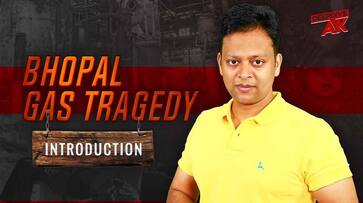Abhinav Khare deep dives into what transpired during and after the Bhopal Gas Tragedy of 1984 in which an estimated 10,000 deaths were reported with over 30,000 disabled
It was the wee hours December 3, 1984. From the Union Carbide India Limited (UCIL’s) pesticide factory rose a poisonous grey cloud which covered the sky of Bhopal. And this was worse than what can be called a called a nightmare. The fatal gas engulfed the entire city and people on the streets were running helter-skelter, unable to understand what to do. No, there were no warning bells nor was there an evacuation plan. Even when those affected reached the hospital, the doctors did not know how to treat them as there was no emergency information provided to them. It was only after sunrise that the magnitude of destruction was realized. There were dead humans and animals strewn across the roads, the leaves had turned black and the air reeked of burnt chillies. It is estimated that there were around 10000 deaths and over 30000 who became disabled.
It was only after this disaster when some ethical issues were ever raised. This hazardous pesticide plant was built in an area which was densely populated. UCIL decided to store such a poisonous chemical in these areas which was inhabited by over a lakh people. The recommended cooling was shut down 5 months prior to the disaster and nobody even noticed this. This was supposedly a part of Union Carbide Corporation’s global economy drive. In fact, all the vital gauges and indicators were defective. The flare tower which is supposed to burn of the poisonous gas was also under repair. This was indeed a recipe for disaster.
ALSO READ: Deep Dive with Abhinav Khare: Why we need a guide like Krishna, a fighter like Arjun?
To blow wind to the fire, UCC had also halved the number of workers in the Bhopal factory between 1960 to 1984. This naturally affected the safety and maintenance of the factory. To give a rough idea, the number of work crew for this MIC plant was halved from twelve to six and the position of maintenance supervisor was chucked. Even the period of safety training was reduced from six months to just 15 days.
What happened next? Watch Deep Dive with Abhinav Khare to know the entire story behind Bhopal Gas Tragedy.
About Abhinav Khare
Abhinav Khare is the CEO of Asianet News Network and also the host of a daily show named Deep Dive with AK. He has a lifetime collection of books and gadgets and has already pinged more than hundred cities around the globe.
He is a tech entrepreneur, who is passionate about policy, technology, economy and philosophy from ancient India. He earned an MS Engineering from the ETH Zurich and an MBA Finance from the London Business School.
Last Updated Nov 5, 2019, 8:34 PM IST









![Salman Khan sets stage on fire for Anant Ambani, Radhika Merchant pre-wedding festivities [WATCH] ATG](https://static-gi.asianetnews.com/images/01hr1hh8y86gvb4kbqgnyhc0w0/whatsapp-image-2024-03-03-at-12-24-37-pm_100x60xt.jpg)
![Pregnant Deepika Padukone dances with Ranveer Singh at Anant Ambani, Radhika Merchant pre-wedding bash [WATCH] ATG](https://static-gi.asianetnews.com/images/01hr1ffyd3nzqzgm6ba0k87vr8/whatsapp-image-2024-03-03-at-11-45-35-am_100x60xt.jpg)


